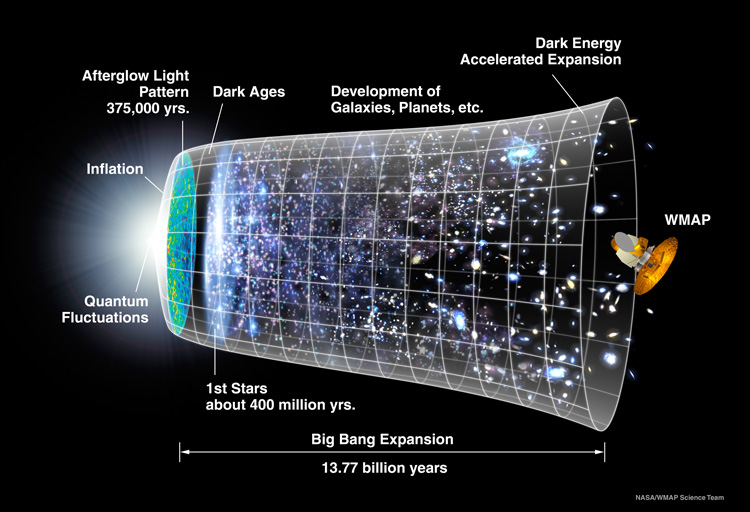- Evidence for Universe Expansion Found
- Evidence for Universe Expansion Found
- Scientists: Find explains how universe formed
- Cold War gamma-ray mystery solved in a flash
- U.S. spacecraft set to study cosmic bursts
![]()
| Front page |
|
|
|
Oldest light shows universe grew fast, researchers say
First stars arose 400 million years after big bang, not 200 million years, as once thought
Baltimore Sun
Scientists examining the oldest light in the universe say they've found clear evidence that matter expanded at an almost inconceivable rate after the big bang, creating conditions that led to the formation of the first stars.
Light from the big bang's afterglow shows that the universe grew from the size of a marble to an astronomical size in just a trillionth of a second after its birth 13.7 billion years ago, researchers from Johns Hopkins and Princeton universities said.
Readings from a NASA probe also show that the earliest stars formed about 400 million years after the big bang — not 200 million years afterward, as the research team once thought.
"With this new data, theories about the early universe have just taken their first exam, and they passed with flying colors," said David Spergel, a Princeton astrophysicist and co-author of the findings published Thursday.
The results are based on readings from the Wilkinson Microwave Anisotropy Probe, a robotic instrument with two telescopes that sweeps the sky every six months in an orbit a million miles from Earth.
Light from the probe also has confirmed a theory that the universe is made up mostly of dark energy, a mysterious force that continues to cause the universe's expansion, said Johns Hopkins astrophysicist Charles Bennett, the probe's principal investigator.
"This light is just invaluable. It's really the only fossil we have from that time," Bennett said.
Inflationary theorists argue that at the time of the big bang, the universe was at first microscopic. But three events changed things: fluctuations in temperature, bursts that transformed energy into matter and a rapid expansion of the universe that ultimately enabled stars and galaxies to form.
By polarizing and filtering out light from the earliest stars, the researchers were able to uncover evidence of those inflationary moments — fluctuations in brightness of the light scattered around the big bang's afterglow. "It amazes me that we can say anything about the first trillionth of a second of the universe, but we can," Bennett said.
The researchers say the findings also confirm that only 4 percent of the universe is composed of the familiar atoms that make up what we see around us.
Another 22 percent is dark matter — a gravitational force made up of cold particles — and 74 percent is dark energy, a force that appears to be causing the universe to expand.
Experts say the findings will help scientists for years as they try to unravel mysteries about the early universe.
